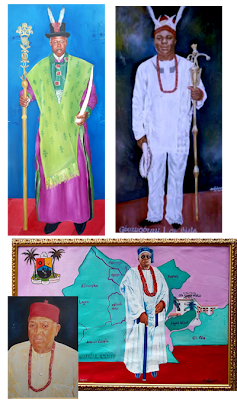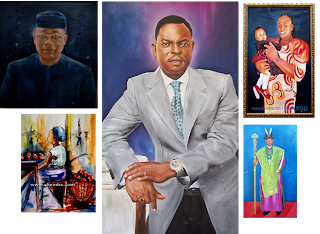Search This Blog
Showing posts with label famous portrait artists 21st century. Show all posts
Showing posts with label famous portrait artists 21st century. Show all posts
Monday, May 12, 2014
Thursday, June 6, 2013
The best portrait painting artist in Nigeria - chembx
Looking for the Best Portrait Painting, Artist in Nigeria? You have finally found Chembx, He is the Best Portrait Painting Artist in Lagos Nigeria. His works with Oil color, acrylics, poster and charcoal. The Pictures you see here are the photographs of some of the Paintings that i did. Please click on ORDER NOW to Book for your own portrait artwork. Tel: +2348054307243 ; +2348080310051 . Website: www.chembx.com |
 |
| The Best Royal Portrait Painted Artworks in Nigeria |
Location:
Ojo, Lagos, Nigeria
Thursday, August 18, 2011
SOME INDIGENOUS NIGERIA ARTS AND CRAFT.
https://chembx.com
3. CALABASH DECORATION:
Calabash decoration has become an important aspect of Nigeria art experiences. It involves the creation of beautiful effects on the surface of a calabash using the design elements. Gourds belong to the family of pumpkins or cucumbers. When they are fully grown, and this is when the green skin becomes yellowish, one can only either allow pulp and the seeds inside to dry up in the sun thereby separating the hard shell from the yellowish skin which by this has turned yellow ochre in colours; or by soaking up the ripe gourd in water. This will be wash up later, clean, depending on the size and shape of the gourds, they can be utilized as calabash bowl for drinking water or liquid foods, hawking and storage of foodstuffs, as ceremonial bowls for social as well as religious occasions, as musical instruments (rattler, “shantu”,). Also gourds in the collection and storing of palm-wine; they are used by some tribes to shield the head from sun or rain; they are also use in storing apparel or trinkets.
The people known traditionally for decoration of calabash for visual appeal are from Oyo town in Oyo state.
The calabash decorators remove skin or cuticle off by scraping with a sharp knife before decoration. Also, the calabash can be painted red, burnt sienna, orange or black before decorative patterns are created.
The various methods of achieving decorations on calabash are: Carving, scraping, scorching, engraving. Lines of different types exist on the calabash design. Other patterns of tradition implications are used.
4. LEATHER WORKS AND SKIN DECORATION
Leather and skin works are widely practiced crafts in Northern part of Nigeria but they are in particular developed in sokoto, kano and Maiduguri. However, kano has remained the most important centre because of its position in business activities.
From the Northern cities, different types of leather products are produced ranging from bags, cushions, dress, and shoes, among others.
Jima-Tanning: Jima is the word for tanning in Hausa and every town of reasonable size has got a tanner’s yard. At kano, the Head Tanner is Alhaji Abubakar while the son Basha, takes charge of the snake, goat and sheep skin section.
PROCESS OF TANNERY
1 Whitening- Here, the dry skin is soaked in clean water for a day or more and then put in a solution of Toka (wood-ash) and farin Kasa (lime)
The skin then removed from the solution and spread on the wooden board for the hair to remove with a blunt metal knife (guza). This then washed in fresh water and soaked in “bagaruwa”, a solution of powered seeds for another day. This solution has the effect of making the leather very durable, pliable and smooth.
After this, the meat is scraped off the inner surface with a knife and then washes in fresh water. After this, toka is rubbed on the other side and spread to dry.
Location:
Nigeria
Subscribe to:
Comments (Atom)




